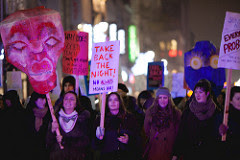AskAnAdvocate: This article from ThinkProgress.org talks about many of the long-term effects abuse has on survivors and their children. The most important things to note are that people who experience family violence are more likely to become depressed, develop PTSD and other anxiety disorders, and also 15x more likely than the average population to use alcohol or other substances to cope with what they have been/are going through.
Also it's worth pointing out that while some people do go on to be abusive themselves, more often people who experience family violence early go on to face violence/abuse again.
There is some good news, however. Emerging research shows that young people who can find one stable, supportive adult in their lives - a person who acts as a sort of champion and mentor for the young person - can overcome many of these long-term effects.
Not all of us can have mentors that look like this:
But really, any stable adult that you feel safe with and whom you'd like to be more like is a good choice. Some schools even have specific mentor programs set up to help Teens and young people have a better shot at success on their own terms. You can check out Moscow High School's program right here to apply or to volunteer!


